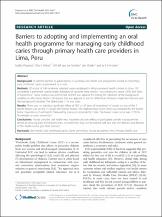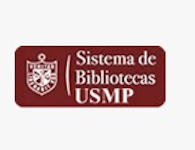Barriers to adopting and implementing an oral health programme for managing early childhood caries through primary health care providers in Lima, Peru

Ver/
Descargar
(application/pdf: 341.9Kb)
(application/pdf: 341.9Kb)
Fecha
2014-03-06Autor(es)
Pesaressi, Eraldo
Villena, Rita S.
van der Sanden, Wil JM.
Mulder, Jan
Frencken, Jo E.
Metadatos
Mostrar el registro completo del ítemResumen
Background
To identify barriers to participation in a primary oral health care programme aimed at preventing early childhood caries, as perceived by nurses.
Methods
Of a total of 140 randomly selected nurses employed in 40 government health centres in Lima, 123 completed a pre-tested questionnaire. Background variables were districts’ ‘socio-economic status’ (SES) and ‘years of experience’. Factor analysis was performed. ANOVA was applied for testing the influence of the background variables on the barrier factors. Chi-square test was applied to test for differences between single item barriers and the background variables. The Likert-scale (1–4) was used.
Results
There was no statistical significant effect of ‘SES’ or of ‘years of experience’ of nurses on any of the 7 barrier factors, nor on the 11 single item barrier factors. The highest mean score (3.81) was obtained for the barrier factor ‘importance of oral health’, followed by ‘perceived responsibility’ (3.44). The lowest mean score was (1.70) for ‘knowledge on caries prevention’.
Conclusions
Nurses consider oral health very important and are willing to participate actively in programmes aimed at reducing Early Childhood Caries, provided that they will be trained well and that the director and dentists of the health centre give their consent.
Colecciones
- Artículos [274]







